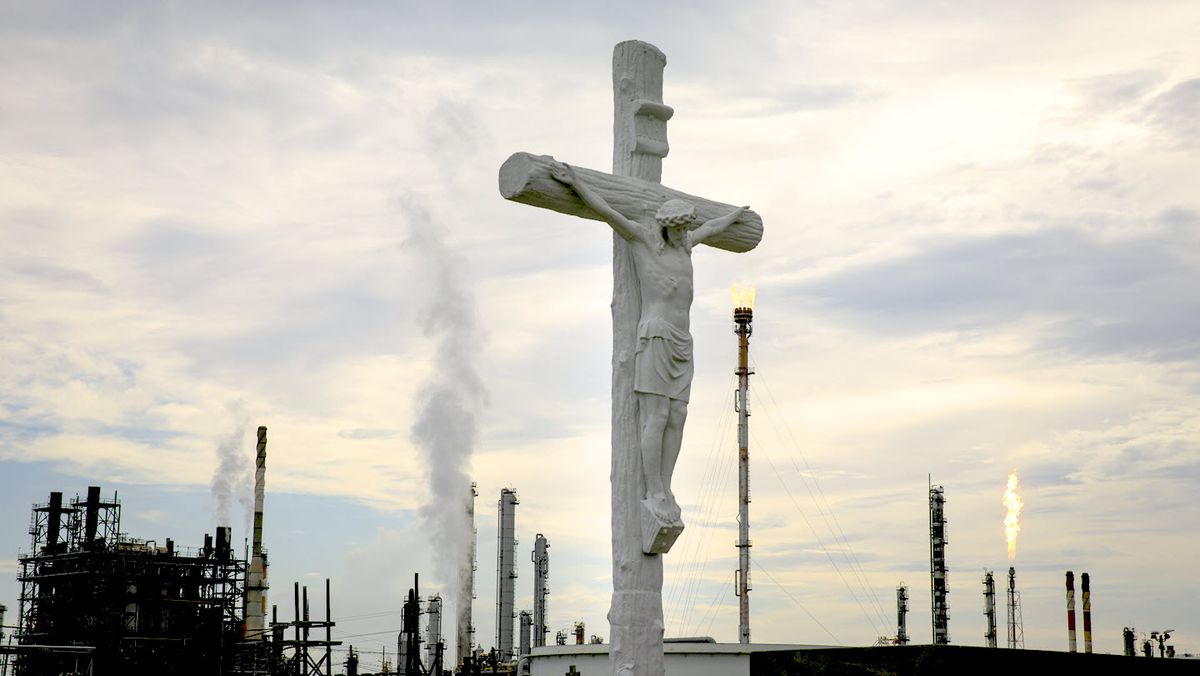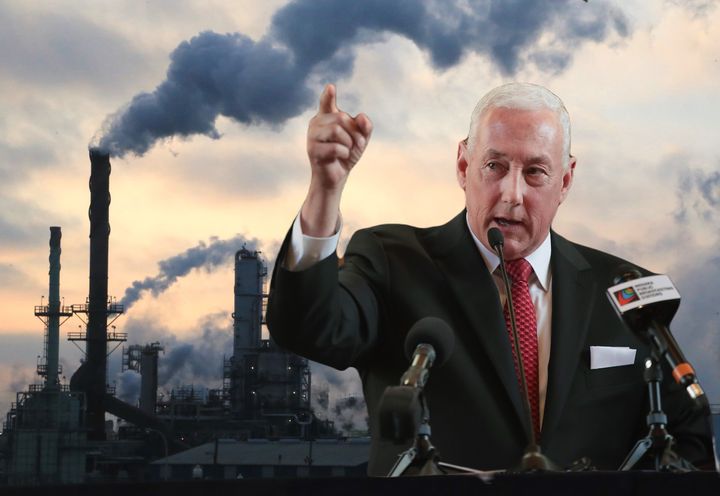Who Will Represent the People of Cancer Alley?
In the race to replace oil and gas ally Cedric Richmond, the leading candidates have their own histories with the industry.

Just upstream along the Mississippi River from New Orleans lies a stretch of land that contains seven of the ten most polluted census tracts in the United States, including areas where cancer risks are hundreds of times higher than the national average, according to data from the Environmental Protection Agency. The area has been dubbed Cancer Alley, and the culprit is clear: more than 150 oil and chemical refinery plants owned by companies including BASF, Dow, and ExxonMobil have for decades spewed toxic chemicals like benzene, chromium, and polycyclic aromatic compounds into the air that is breathed by the area’s residents, the majority of whom are Black and have lower income.
Cancer Alley has been represented in the U.S. House of Representatives for years by allies of the chemical and oil companies that are responsible for their constituents’ high cancer and death rates. For the past decade, the district’s representative was Cedric Richmond, a Democrat who often voted with Republicans on energy legislation. While voting for policies to boost petroleum extraction and reduce environmental review requirements, Richmond funded his campaigns from the PACs of the companies polluting his district. Constituents who sought his assistance in dealing with chemical plants polluting their neighborhoods found the congressman to be uninterested in what they had to say, according to a report from The Guardian.
Richmond has been hired by the Joe Biden administration as a senior adviser and director of the White House Office of Public Engagement, so Cancer Alley and the rest of the district will vote on March 20 in a special election to choose their next representative. More than a dozen candidates will appear on the ballot, and if no candidate gets more than 50% of the vote, the top two vote-getters would advance to a runoff on April 24. Polls have consistently indicated that it’s likely a two-person race, with a third candidate trailing but not totally out, and several other candidates polling in the low single digits.
Both of the leading candidates are Louisiana state senators who have taken thousands of dollars in contributions from the oil and gas industry for their past campaigns, according to data from the National Institute on Money in Politics, but one of them, Karen Carter Peterson, has clearly put forth more effort to express environmentalist credentials in the current congressional race than Troy Carter, minority leader of the state Senate.
On the proposal for a Green New Deal, which has become a sort of litmus test for Democratic candidates’ climate credentials, Peterson and Carter are divided.
“I’m all in for a Green New Deal,” Peterson told Sludge. “Nowhere has felt the brunt of the climate crisis more than Louisiana — particularly workers and communities of color. That’s why I’ve been a strong supporter of clean energy and environmental protection throughout my career, and why I plan to fight to pass the Green New Deal in Washington.”
When Carter was asked by a Sunrise New Orleans activist on March 5 whether or not he supported the Green New Deal, he declined to give a yes or no answer, instead saying that it is a “great framework.”
Carter did not respond to Sludge’s questions about his position on the Green New Deal and other matters.
Carter told the Sunrise activist that his campaign had “not taken any money from petrochemical” and that he had signed the No Fossil Fuel Money pledge. However, Sludge found that Carter’s campaign had in fact taken several donations from the fossil fuel industry in the month before making that statement.
New Orleans-based petroleum products wholesaler Infinity Fuels LLC donated the 2020 cycle maximum of $2,800 to Carter’s campaign on Dec. 31, 2020. The CEO of Natural gas service provider Entergy Louisiana, Phyllip May, donated $500 to Carter in February. Phyllis Taylor, the CEO of Taylor Energy, gave Carter the 2020 cycle legal maximum of $2,900. Taylor Energy is the company behind an ongoing offshore oil spill that has been spewing about 380 to 4,500 gallons of oil into the Gulf of Mexico per day.
“Yet again, Troy’s words don’t seem to match his actions,” Peterson told Sludge in regard to Carter’s fossil fuel donations.
The organizers of the No Fossil Fuel Money pledge told Sludge that all these contributions would constitute violations, but that Carter signed the pledge on March 5 and the pledge is forward-looking from when it is signed. “The No Fossil Fuel Money coalition encourages pledge signers to return any past fossil fuel contributions and we’ve had many candidates who have done so in the past,” they added.
Carter has been endorsed by Richmond, House Majority Whip Rep. James Clyburn (R-S.C.), Rep. Ro Khanna (D-Calif.), and other prominent Democrats. His federal Democratic donors include the leadership PAC of Rep. Filemon Vela (D-Texas), a founding member of the Congressional Oil and Gas Caucus.
Peterson signed the No Fossil Fuel Money pledge on March 1. Sludge identified a donor to both Peterson and Carter that would have constituted a violation if it was received after signing. Lobbyist Randall Womack of Harris, DeVille & Associates donated $2,800 each to Carter and Peterson in December 2020. Womack’s lobbying clients include multiple fossil fuel interests, including Koch Companies Public Sector, Louisiana Oil and Gas Association, Sasol North America, and Gulf South Pipeline Company.
In addition to serving as a Louisiana state senator, Peterson has worked as counsel at the Dentons law firm’s global energy practice since 2014. The company, one of the largest law firms in the world, represents oil and gas companies including Total SA, Enbridge and Lukoil, as well as renewable energy companies engaged in solar and wind development. Peterson told Sludge that she did not represent any oil and gas companies at the firm, adding that her work “never contradicted the values I hold in the Green New Deal and the fight for climate justice.”
Responding to a candidate survey from The Coalition Against Death Alley, Peterson declined to explicitly oppose new petrochemical plants along the Mississippi, saying that such plans should be considered on a case-by-case basis. A subsidiary of Taiwan-based Formosa Plastics is seeking to build a new plastics production complex along the river in St. James Parish that has been approved by the state to emit 800 tons of toxic air pollutants each year. Many residents of the year area oppose the proposal on the grounds that it would further deteriorate the local air quality while also contributing to global warming by emitting millions of tons of greenhouse gases. Neither Peterson nor Carter have come out against the Formosa proposal.
Peterson’s endorsers include the League of Conservation Voters Action Fund, Our Revolution, and the Congressional Progressive Caucus PAC.
Carter and Peterson have split on major votes affecting the oil and gas industry during their time in the state Senate. In 2018, Carter voted with Republicans on a critical infrastructure bill that established new criminal penalties on protesters and others who step onto land owned by the oil and gas industry. The bill was used to charge journalist Karen Savage and others in August 2018 for entering property owned by Energy Transfer Partner for construction of the Bayou Bridge oil pipeline. The bill was supported by Energy Transfer Partners as it moved through the legislature. Peterson was one of four senators to vote against the bill.
The candidate polling third in the contest, Baton Rouge community activist Gary Chambers, has a far more robust environmental platform on his website. Chambers endorses the Green New Deal and outlines an environmental justice platform he says he developed with input from residents of the district. His plan calls for full federal funding for Louisiana’s Department of Environmental Quality’s environmental justice programs, strengthening community involvement in the Superfund cleanup process, increasing fines on polluters, and limiting the use of eminent domain. Chambers did not respond to Sludge’s request for comment for this article.
Last week, the New Orleans hub of the Sunrise Movement put out a Green New Deal scorecard grading Chambers, Peterson, and Carter. Chambers got the highest score on each of the four topics evaluated by the group—green economy, racial and climate justice, commitment to a Green New Deal, and holding polluters accountable—followed by Peterson and then Carter.
Read more:




Comments ()